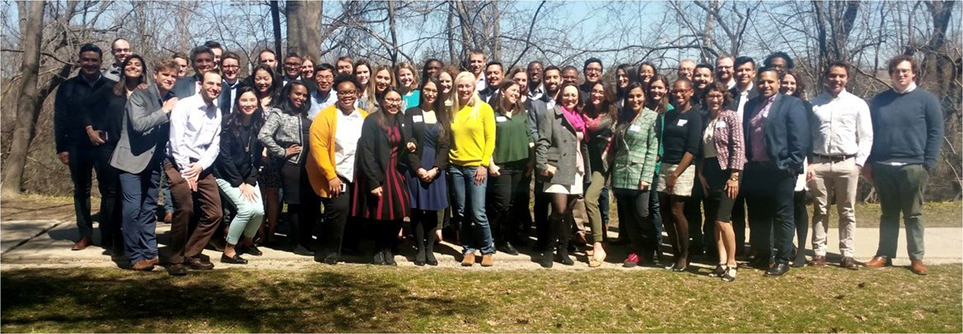The Politics of Race, Immigration, and Ethnicity Consortium (PRIEC) is an academic forum for scholars of race and ethnicity politics (REP) and REP scholarship. As an ongoing series of meetings, PRIEC convenes REP scholars to present works-in-progress and serves as a welcoming forum for graduate-student mentoring, as well as junior-faculty socialization and advancement. PRIEC welcomes contributions from various perspectives, disciplines, and methods, with the only requirement that the work be related to politics and race or ethnicity.
Five features of PRIEC distinguish it from other conference platforms. First, PRIEC does not require a completed paper—only a proposal—which encourages scholars to present work at any stage in the research process. Second, PRIEC strongly encourages, facilitates, and prioritizes graduate-student participation as presenters. Third, PRIEC distributes the costs and service burden of hosting meetings by rotating among different institutions. Fourth, PRIEC does not charge a registration or membership fee to attend, which is crucial to scholars whose institutional support falls short of the rising costs to fully participate in the major regional and national political science conferences. Fifth, PRIEC traditionally meets on Friday and ends with an informal dinner reception at the home of a senior-faculty colleague from the hosting institution.
These five features reflect broader commitments that PRIEC members share with respect to mentoring, inclusion, networking, and addressing pipeline challenges. The aim of these five features is to facilitate community building and encourage networking in a collegial atmosphere, which counters the deficit in social assets that many first-generation, minority, women, and other underrepresented scholars face as an obstacle to their long-term career success. Collectively, these features distinguish PRIEC as an outlet in which scholars from the full range of research and teaching institutions exchange ideas and advance science.
The inaugural PRIEC in 2005 was hosted by Shaun Bowler and Karthick Ramakrishnan, faculty from the University of California, Riverside. Since then, PRIEC meetings have continued quarterly, organized and attended mostly by scholars in Southern California.
The aim of these five features is to facilitate community building and encourage networking in a collegial atmosphere, which counters the deficit in social assets that many first-generation, minority, women, and other underrepresented scholars face as an obstacle to their long-term career success.
Under Francisco Pedraza’s leadership, PRIEC has expanded in a number of important ways. First, despite operating on a “shoestring” budget, PRIEC now boasts a web presence (www.priec.org) and an active social media profile (Twitter: @WeArePRIEC), which are used to archive meeting programs, announce future meetings, and promote the work of scholars whose research addresses the politics of race, immigration, and ethnicity. The website also lists job candidates in the subfield, which can serve as a crucial information cue for members of search committees.
Second, PRIEC now integrates pre-PRIEC methodology workshops, such as a hands-on mini-course on how to create survey weights led by Matt Barreto and another taught by Melissa Michelson on the fundamentals of survey experiments. Third, Pedraza, along with Gabe Sanchez, coordinated the first themed PRIEC at the University of New Mexico, where they highlighted scholarship focused on Native American politics, an underrepresented area of research at PRIEC conferences. Fourth, in 2019, PRIEC introduced the first full-day undergraduate research showcase, hosted by Brad Jones at the University of California, Davis, to complement the Friday PRIEC meeting and further PRIEC’s investments in the REP graduate-training pipeline.
Since its initial founding, PRIEC has expanded to include researchers outside of California and has coordinated more than 50 meetings at 25 different institutions across the country featuring research by more than 200 scholars. PRIEC has now convened at University of Washington, Seattle, University of Oregon, Stanford University, University of New Mexico, Purdue University, Texas A&M, Michigan State University, Wake Forest University, Cornell University, and Boston University—to name a few. In response to growing demand, PRIEC meetings also have increased from three to six or seven per year.
The overwhelming interest in PRIEC outside of California was confirmed recently at Michigan State University (MSU), where Nazita Lajevardi and Eric Gonzalez Juenke coordinated and managed a one-day meeting consisting of five panels, 26 presentations, and a poster session with 16 posters. Panel presentations were brief and were conducted “Five-Minute-Fiesta” style,Footnote 1 including 30 minutes of Q&A for each panel. The afternoon poster session was a roaming happy hour; each poster was assigned a senior scholar as a discussant who commented on the poster in depth. The evening concluded with a dinner at Lajevardi’s home. Together, 75 participants from the REP community at MSU, Michigan broadly, the Midwest, and California attended the one-day meeting (figure 1 is a photograph of participants). To promote their attendance, out-of-state participants were offered between $150 and $300 of support to offset travel costs. Similar to the support occasionally offered by hosts at other institutions, this funding came from PRIEC, the organizers’ personal research accounts, Chicano Latino Studies at MSU, and the political science department at MSU. The MSU meeting is illustrative of PRIEC’s commitment to inclusivity, mentoring, and addressing pipeline challenges.

Figure 1 Photograph of Many of the Participants at MSU PRIEC; April 20, 2018.
The benefits of attending and hosting a PRIEC meeting are numerous for REP scholars and for their universities more broadly. In addition to creating a welcoming space for junior scholars to access professionalization and mentorship opportunities, PRIEC meetings provide numerous public goods to a university as a whole. For instance, hosting a PRIEC meeting increases the national recognition of a university; supports a university’s diversity and inclusion goals; and provides professional development for assistant professors, graduate students, and even undergraduate students. PRIEC meetings also support faculty of color (who often are REP scholars) and foster a community of race scholars in their own as well as nearby universities.





